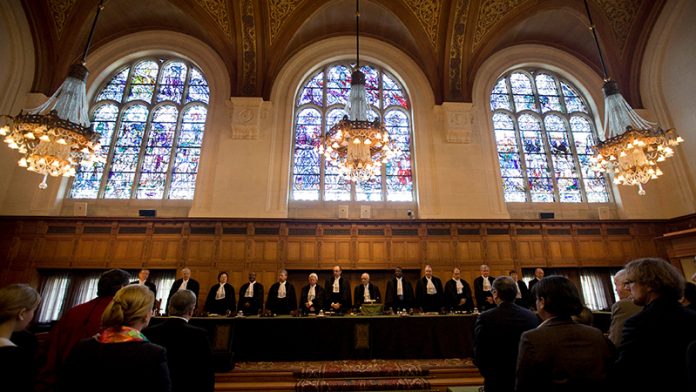Litigation at the International Court of Justice: An Overview
Introduction:
- The judicial branch of theUnited Nations (UN) is named as International Court of Justice.
- Its seat is in thePeace Palace in The Hague, Netherlands;
- ICJ settles legal disputes which the states submit to it and also provides advisory opinions on legal questions duly authorized international branches, agencies, and theUN General Assembly, when submitted to it.
- It was established in June 1945 and started working in April 1946.
LITIGATION IN INTERNATINAL COURT OF JUSTICE: JURISDICTION AND PROCEDURE
Contentious Cases:
Only States which have become parties to the Statute of the Court or which have accepted its jurisdiction under certain conditions may be parties to contentious cases.
The Court is competent to settle a dispute only if its jurisdiction is accepted by the States concerned in one or more of the following ways:
- by entering into a special agreement to submit the dispute to the Court;
- by virtue of a jurisdictional clause;
- through the reciprocal effect of declarations made by them accepting the jurisdiction of the Court.
Proceedings may be instituted in one of two ways:
- through the notification of a special agreement:
Either or both the states parties to proceedings can lodge this document with the Court, provided a special agreement mentions the parties and the dispute that has aroused between them. In this, neither party is “applicant” State nor a “respondent” State, hence name of parties are separated by an oblique stroke at the end of the official title of the case. The document is bilateral in nature.
- by means of an application:
The application is of a unilateral nature. Applicant State submits it against respondent State to communicate to the latter State and the Rules of Court contain stricter requirements with respect to its content. In application, Applicant State should mention mane of the party against which the claim is brought and the subject of the dispute along with basis of dispute. The official title ends with the names of the two parties, separated by “v.” e.g., Nicaragua v. Colombia.
Contentious proceedings include a written phase (may be in English or French), in which the parties file and exchange pleadings containing a detailed statement of the points of fact and of law on which each party relies, and an oral phase consisting of public hearings at which agents and counsel address the Court. The written pleadings can be made available to the press and public only if the parties have no objection and that too not until the opening of the oral proceedings. the Court delivers its judgment at a public sitting. The judgment is final, binding on the parties to a case and without appeal provided it may be subject to interpretation or revision.
A State which contends that the other side has failed to perform the obligations incumbent upon it under a judgment rendered by the Court may lay the matter before the United Nations Security Council (UNSC), which is empowered to recommend or decide upon the measures to be taken to give effect to the judgment.
Advisory Proceedings:
Advisory proceedings before the International Court Justice are open solely to five organs of the United Nations and to 16 specialized agencies of the United Nations family.
The UNCA and UNSC may request advisory opinions on “any legal question”, while others can only do so with respect to “legal questions arising within the scope of their activities”.
The Court, gives its advisory opinion with full knowledge of the facts and is also empowered to hold written and oral proceedings.
As few days passes after the filing of request, the Court issues a list of those States and international organizations which shall furnish information on the question before the Court. Usually the States listed are the Member States of the organization requesting the opinion.
The ICJ usually doesn’t allow international organizations other than the one having requested the opinion to participate in advisory proceedings. It happened only once; Court authorized non-governmental international organizations to furnish information in International Status of South West Africa.
The written proceedings are shorter in advisory proceeding. But they are as flexible as in contentious proceedings between States. The written statements are generally made available to the public at the beginning of the oral proceedings. Oral proceedings are contented at public sittings. Proceedings are concluded at a public sitting by delivery of the advisory opinion.
Advisory opinion has no binding effect and is open to the requesting organ, agency or organization to accept it or not. However, it can be made binding by certain like conventions on the privileges and immunities of the United Nations.





